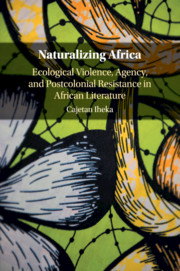
-
Select format
-
- Publisher:
- Cambridge University Press
- Publication date:
- 24 November 2017
- 07 December 2017
- ISBN:
- 9781108183123
- 9781107199170
- 9781316648643
- Dimensions:
- (228 x 152 mm)
- Weight & Pages:
- 0.43kg, 220 Pages
- Dimensions:
- (229 x 152 mm)
- Weight & Pages:
- 0.35kg, 224 Pages
You may already have access via personal or institutional login
Book description
The problem of environmental degradation on the African continent is a severe one. In this book, Cajetan Iheka analyzes how African literary texts have engaged with pressing ecological problems in Africa, including the Niger Delta oil pollution in Nigeria, ecologies of war in Somalia, and animal abuses. Analyzing narratives by important African writers such as Amos Tutuola, Wangari Maathai, J. M. Coetzee, Bessie Head, and Ben Okri, Iheka challenges the tendency to focus primarily on humans in the conceptualization of environmental problems, and instead focuses on how African literature demonstrates the interconnection and 'proximity' of human and nonhuman beings. Through this, Iheka ultimately proposes a revision of the idea of agency based on human intentionality in African literary studies and postcolonialism: that texts yoke the exploitation of Africans to the despoliation of the environment, and they recommend responsibility toward human and nonhuman beings as crucial for ecological sustainability and addressing climate change.
Awards
Winner, 2019 ASLE Ecocritical Book Award, Association for the Study of Literature and Environment
Winner of the 2020 First Book Award, African Literature Association
Reviews
'Naturalizing Africa is an essential addition to environmental studies in Africa. Iheka has an impressive command of the interface between human communities and non-human ecologies and the way literature can illuminate some of the most vital environmental challenges of our time.'
Rob Nixon - Currie C. and Thomas A. Barron Family Professor in the Humanities and the Environment, Princeton University, New Jersey
'Through its focus on non-human agency and what Cajetan Iheka calls ‘the proximity’ of human and non-human actors, Naturalizing Africa offers an innovative approach to the role African literary studies can play in addressing environmental degradation and injustice in Africa. It represents an insightful and significant contribution to literary, postcolonial, and environmental studies.'
Byron Santangelo - Professor of English, University of Kansas
'Cajetan Iheka delivers a beautifully researched referendum on the Eurocentric limitations of both Enlightenment and postcolonial thought, seeking to relocate African ecocriticism and environmental activism in a primarily indigenous African understanding of the relations of humans with non-humans. His delineation of an ‘aesthetics of proximity’ as a means of representing multispecies relationships adds yet another dimension to the most progressive scholarship in animal studies, ecocriticism, and the new materialism.'
Stephanie LeMenager - Moore Endowed Professor, Department of English, University of Oregon
'Brilliantly countering the anthropocentrism of much ecocritical scholarship on African literatures, Cajetan Iheka’s Naturalizing Africa offers important new interventions into African, postcolonial, and environmental studies. Through its skillful, expert analyses of literary representations of ecological crises from across the African continent, this book also contributes significantly to envisioning alternative, sustainable ecosystems.'
Karen L. Thornber - Professor of Comparative Literature, Harvard University, Massachusetts
'Cajetan Iheka’s Naturalizing Africa is an eloquent, theoretically sophisticated contribution to the growing body of ecocritical work engaged with the Global South. This book vividly illuminates the cultural causes of and responses to Africa’s environmental crises, using carefully chosen examples from various sub-Saharan regions.'
Scott Slovic - Professor of English, University of Idaho and coeditor of Ecocritical Aesthetics: Language, Beauty, and the Environment and Ecocriticism of the Global South
'Iheka's Naturalizing Africa is a book that is uncanny in its prescience. Marshalling synthesizing a range of debates in environmental, animal, and African literary studies, it not only elaborates the grounds of current debates in these fields but also illuminates a pathway for what is to come. This is going to be of tremendous influence for a very long time.'
Ato Quayson - Professor and Director of the Centre for Diaspora and Transnational Studies, University of Toronto
Contents
Metrics
Altmetric attention score
Full text views
Full text views help Loading metrics...
Loading metrics...
* Views captured on Cambridge Core between #date#. This data will be updated every 24 hours.
Usage data cannot currently be displayed.
Accessibility standard: Unknown
Why this information is here
This section outlines the accessibility features of this content - including support for screen readers, full keyboard navigation and high-contrast display options. This may not be relevant for you.
Accessibility Information
Accessibility compliance for the PDF of this book is currently unknown and may be updated in the future.


